Just before Sudeten Creche hit the road to tour Europe for the first time in decades I managed to catch up with them for a quick chat about the past, present and future of the group.
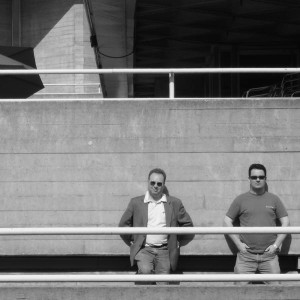
Igloo :: So how did the group meet in the first place? Was Sudeten Creche an idea from the get go? Where did the band’s name come from?
MW :: We met at School in 1976 but did not form Sudeten Creche until 1981 when we met again at College. I think the name idea came from Paul’s brother, who had spent time in Berlin in the late ’70’s. The Sudetenland had been a topic in my 20th Century history class at school, so I knew some of the political references. We have always liked names that are a combination of the innocent and the sinister and it appealed to me because of this.
PC :: Yes, school then college – the idea was very experimental to start with. For example, we used to mix in shortwave radio interference with synths and drum machines (I remember one track being called the ‘TEAC Explodes’). it was quite industrial in the early days – some influences from TG and Cabaret Voltaire there. It was in 1982 I first recall a melody being added to the mix.
Igloo :: What did you guys do between Kindergarten in ’83 and Wounds in 2008′? After nearly 25 years, why did you return to music and releasing?
MW :: Sudeten Creche was one on many projects we worked on. Some other projects that Paul and I worked on together were This Collaboration and World Gone Mad, some of which involved others. We also did independent projects as well. In the mid to late 1990’s our careers also took us to different parts of the world and I was involved with a number of other bands during this time. in 2005/6 we found ourselves both back in the UK. Returning was not how we saw it. We just continued what we had already started.
PC :: I was involved in various music projects. Shortly after Kindergarten I was asked by Illuminated records if I would join Kan Kan for their European tour, supporting Simple Minds. Sadly that got called off ahead of the tour starting, for personal reasons within the band. I then went on to do some music production work, including producing a song that renowned songwriter Andy Hill had penned, for a new act on the Razzmatazz roster (simply called Julie). After that I took a long break from music, only really starting again in 1990 – and again working with Mark.
Igloo :: What was your equipment set up back in ’83? Does it differ much to what you are using now?
MW :: Yes it differs a lot. Circa 1982 Paul had a Casio CT202 and an Akai D4000 reel to reel and a small Akai mixing desk plus a selection of guitars and amps. Also a Soundmaster SR88 drum box. We borrowed some equipment like a 1978 EDP Wasp. Around 1983 Paul acquired an MS10. Then in 1984 Paul bought an Allen and Heath 12/8/2 desk and a Tascam 8 Track with DBx units, which we used during the mid to late ’80’s. I bought an Alesis HR16 around 1984/5 and started to experiment with Midi. We still have most of these although now we use a combination of original equipment, like the Casio 202, Korg MS10 but also have more modern items as well like Novation Super Nova, Korg M1 and MS2000. Now we record using a combinations of an Akai DPS16, PC based and Logic. The first sequencers we had were written using Basic on Vic 20’s and Commodore 64’s but now we use software Midi sequencers like Anvil Studio/Reaper and Logic which are networked via Motu MTP/AV’s. This allows the transport controls of many devices to be synchronized which helps a lot. Although we still play a lot of things “by hand” we now use software midi sequencers for complex patterns rather than arpegiators or CV gate.
PC :: Yeah – what he said… :-)
Igloo :: Do you think electronic music today is different to when you guys were first releasing? If so, how has it changed?
MW :: Yes, of course. Recent years have seen an explosion in retrospective labeling of the genre into sub-genres which didn’t exist in 1981. Technology has enabled people with laptops to make music and then find and audience via the internet and this is a great step forward. Fewer people are needed to take an idea from concept to an audience. The quality of the average recording can now equal that of a 1980’s Studio if the person recording understands the technology and the process. However the downside to this maybe that, without the input of studio engineers, producers and others, ideas do not get developed to their full potential but then they are not diluted either. Certainly everyone we worked with in the 1980’s enhanced our work beneficially.
PC :: I think it is different. I think it’s hard to compare electronic music today with that of the great innovators of the ’70s and early ’80s; Tangerine Dream, Kraftwerk, Harmonia and others. Synth and electronic music is so much more accessible now. I see these early guys as true masters of their art.
Igloo :: Why do you think the tracks and sound of 1980s synthesizer music still draws a following?
“I think it’s hard to compare electronic music today with that of the great innovators of the ’70s and early ’80s; Tangerine Dream, Kraftwerk, Harmonia and others. Synth and electronic music is so much more accessible now. I see these early guys as true masters of their art.” (PC)
MW :: For me the key synth sound is the deep rich bass sounds that fill and underpin a song in such an emotive way. It was really difficult to make that sound with a bass guitar without a lot of high quality equipment in the 1980’s and when we heard the sounds the Casio CT202 made, it just inspired us. Such full fat rich sounds that fill the soundscape. They can be sweet, melancholy or dirty but they cannot be made by anything else with the exception perhaps of a full orchestra. This is what does it for me.
PC :: I think many people still view the early synth music with affection partly for the reason that it was so new and experimental. Late 70s and early 80s analogue synth sounds are often associated with a different time – a time when none of us knew if nuclear apocalypse was around the corner – I’m thinking what’s now called Cold Wave and Minimal Wave.
Igloo :: You guys are starting to tour again. What brought you back to the gig scene? How do you feel about performing live again? Where are these gigs gonna be? Any in Scotland ;-)
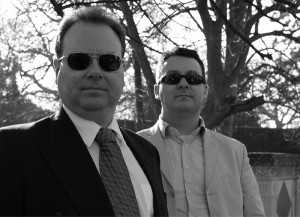
MW :: Unfortunately, there are no plans yet for a Scottish gig but we are very excited to be playing again. After we started to work again in 2006 we started to be asked by a number of venues such as Neon Welt and Zwischenfall to play live but circumstances prevented this. However, we were in Berlin in 2009 and met Jen Ellerson of Brave Exhibitions while Oppenheimer Analysis were playing at the King Kong Klub. It was serendipity. Jen has helped us a lot with our preparations. The gigs are in April 2011 and will be in London (date/venue TBC), 15th April Paris , 16th April Antwerp, Hamburg (Date/venue TBC), Berlin King Kong Klub 21st April and Vienna 23rd April at FLUC. We will publish more details on our website and also on Myspace and Facebook as they become available.
PC :: Live gigs are something we always meant to do more of and something many people tell us they would very much like to see – that’s what spurred us on. We don’t really intend to be regulars on the live scene and this tour may end up being the only one we do – I suppose we should review that after this round. I’d love to include Scotland – it’s always a pleasure to be there, but we’re pretty much fully stacked with the six dates we have – if there’s a next time we should definitely aim to do that.
Igloo :: What are your influences, past and present?
MW :: Past influences around 1981/2 would be The B52’s, Talking Heads, Julian Cope, DAF, Gary Numan, Human League, John Foxx, Kraftwerk and beyond this would include The Smiths, Iggy Pop, Bauhaus, Joy Division, New Order, Velvet Underground, Kenji Kawai, Client, Parallox… there are many but I think I consider these to be seminal.
PC :: So many – but if I had to list a handful – The Doors, The Velvet Underground, Nico, Iggy and the Stooges, Television, Roxy Music, Neil Young. More recently, Keane, Stereophonics and Travis have made lasting impressions – to name few.
Igloo :: What is your most memorable/favourite gig? Past and recent please.
MW :: In the past it was Julian Cope and the Tear Drop Explodes around 1981/2. I think Julian was in his heavy “Acid” phase and it was very surreal. Recently it would be the DAF and Client gig in London in March 2009. I have waited nearly 30 years to see them and they were as good as I hoped they would be. Client was an excellent bonus as well.
PC :: Yep – the Teardrops at Nottingham Uni, Feb ’82 is right up there. If I had to pick I’d be hard pushed to decide between Iggy and the Stooges at Knebworth (2010) and Lou Reed at the Saratoga Winery, near San Jose 2003. I think the latter just pips it – sublime. One of the highlights was Antony Hegarty (as in the Johnsons) singing a version of “Candy Says” that just oozed emotion.
Igloo :: And perhaps the most important question, what was the last record you bought?
MW :: Daybed’s EP Preludes on the Genetic Label.
PC :: Goodbye by Dubstar. I love Client and that’s what got me into them.
Sudeten Creche are currently working on making our entire catalogue available for download plus their long awaited album is getting closer to completion. Try and catch them in a city near you. Listen to Sudeten Creche on Myspace.






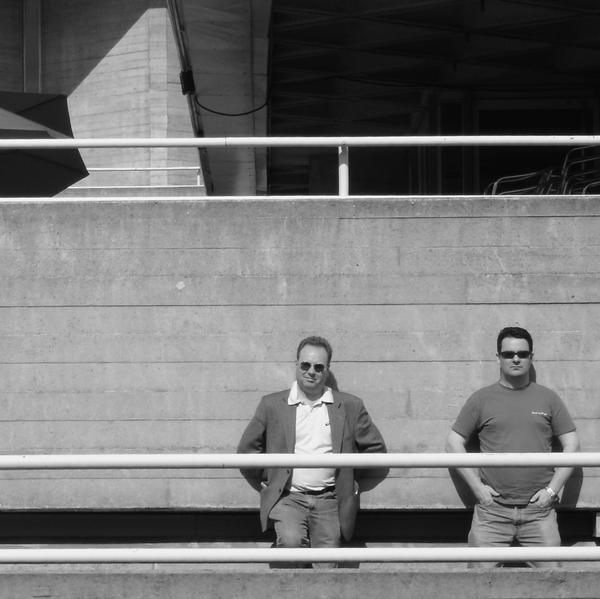





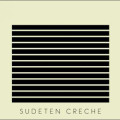
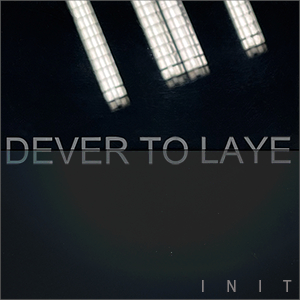

![Romanowitch :: A critical season substitute (glitch.cool) — [concise]](https://igloomag.com/wp/wp-content/uploads/2025/03/romanowitch-a-critical-season-substitute_tape_feat-75x75.jpg)







